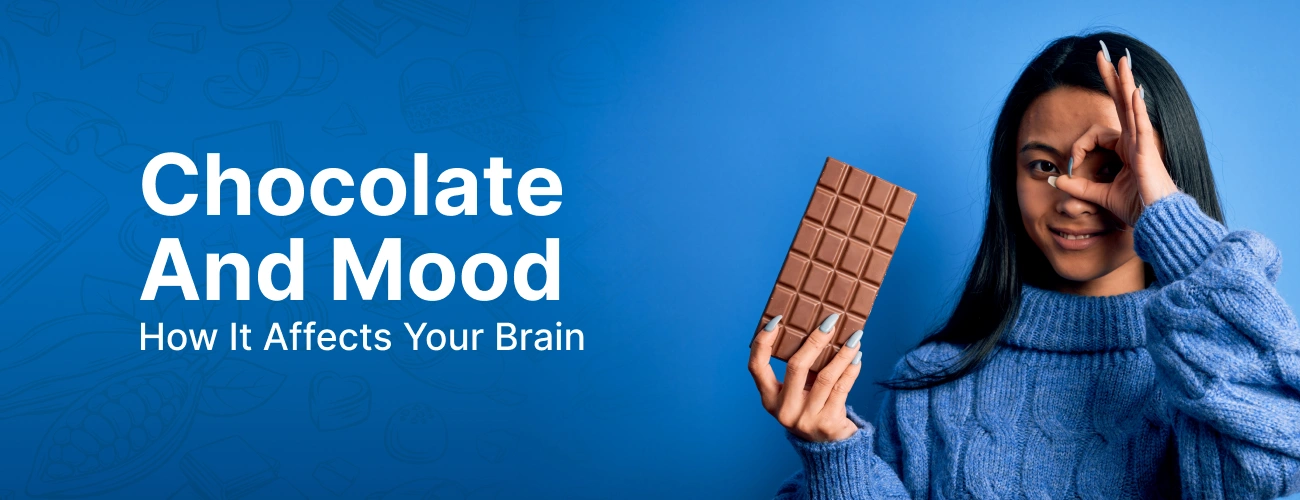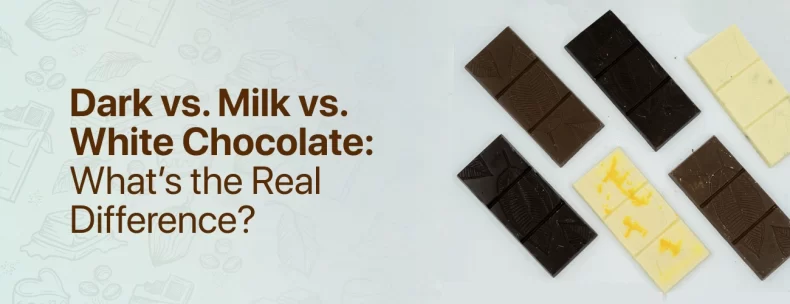
Chocolate and Mood: How It Affects Your Brain
Introduction
Chocolate is one of the most beloved treats worldwide, transcending cultures and age groups. But beyond its sweet taste, there’s more to chocolate than meets the eye. Chocolate has the unique ability to affect the brain in several ways. From lifting your mood to enhancing cognitive performance, it has earned its place not just in the kitchen, but also in our emotional and mental well-being. In this post, we’ll explore how chocolate affects your brain, the science behind it, and how indulging in this delicious treat can alter your mood.
The Science Behind Chocolate’s Mood-Boosting Effects
When you bite into a piece of chocolate, a series of events begins to unfold in your brain. The brain reacts to chocolate’s primary ingredients, particularly the cocoa in dark chocolate. Cocoa is rich in antioxidants and compounds like flavonoids, which are linked to a variety of brain benefits. However, the most significant impact on mood comes from specific chemicals in chocolate that interact directly with brain receptors.
The Key Chemicals in Chocolate That Affect Your Brain
Several chemicals in chocolate contribute to mood enhancement. Here are some of the main players:
- Theobromine
Theobromine is a stimulant found in chocolate that has a mild, caffeine-like effect on the brain. It increases heart rate and boosts energy levels. While not as potent as caffeine, theobromine contributes to the uplifting, invigorating feeling you get from eating chocolate. - Phenylethylamine (PEA)
Known as the “love drug,” PEA is a natural compound found in chocolate that mimics the feeling of being in love. When consumed, PEA triggers the release of endorphins and serotonin in the brain, which are responsible for boosting happiness and well-being. PEA also stimulates the release of dopamine, which is associated with pleasure and reward. - Serotonin
One of the most well-known neurotransmitters, serotonin is often referred to as the “feel-good” chemical. Chocolate helps the brain produce more serotonin, which can improve mood, alleviate anxiety, and reduce feelings of sadness. Increased serotonin levels are also associated with improved sleep and appetite control. - Endorphins
Chocolate is known to trigger the release of endorphins, which are chemicals produced by the brain to promote a sense of happiness and euphoria. Endorphins are natural painkillers and mood elevators, which is why chocolate is often associated with feelings of comfort. - Magnesium
Magnesium is a mineral found in chocolate that plays a crucial role in brain function. It has been linked to a decrease in anxiety and stress levels. Magnesium can also help regulate neurotransmitter activity, which improves cognitive function and mood regulation.
How Chocolate Helps Fight Stress
Stress is one of the most common factors that negatively affect our mood and mental health. Chocolate, particularly dark chocolate, may help combat stress in several ways:
- Reduction in Cortisol: Cortisol is the body’s primary stress hormone. Studies suggest that eating dark chocolate may reduce cortisol levels in the body, thereby alleviating stress and promoting relaxation.
- Antioxidants: The antioxidants in cocoa help reduce inflammation and improve blood flow to the brain, which has a calming effect and can help lower stress levels.
- Improved Brain Function: Dark chocolate can also enhance cognitive function, allowing you to think more clearly and reduce the mental strain that comes with stress.
In short, consuming chocolate activates the brain’s reward system and promotes a sense of well-being, helping to fight off stress in a natural and delicious way.
The Mood-Boosting Benefits of Different Types of Chocolate
Not all chocolates are created equal when it comes to mood enhancement. The type of chocolate you choose plays a significant role in how it affects your brain.
Dark Chocolate: The Mood Enhancer
Dark chocolate contains a high percentage of cocoa, which means it has higher levels of the compounds that promote mood elevation. The higher the cocoa content, the more beneficial the chocolate is for mental and emotional well-being. Dark chocolate typically contains 50-90% cocoa, and this variety offers the maximum concentration of beneficial compounds like flavonoids, theobromine, and PEA.
Numerous studies support dark chocolate’s mood-boosting properties. Research has shown that consuming small amounts of dark chocolate can reduce stress, improve mood, and even enhance brain function. The antioxidants found in dark chocolate can improve circulation and reduce inflammation, helping the brain function at its best.
Milk Chocolate: A Comforting Indulgence
Milk chocolate contains less cocoa than dark chocolate, it still has mood-enhancing properties, though to a lesser extent. The added sugar and fat in milk chocolate can give you an instant sugar high, which provides a quick burst of energy and pleasure. However, this may be followed by a crash, especially if consumed in large quantities.
Milk chocolate also contains the same beneficial compounds as dark chocolate, but in smaller amounts. While it may not be as powerful a mood booster as dark chocolate, milk chocolate still has the ability to release endorphins and serotonin, which can provide a sense of comfort and relaxation.
White Chocolate: Sweet but Less Effective
White chocolate does not contain cocoa solids, which are the source of most of the brain-boosting compounds found in dark and milk chocolate. While it is still a delicious treat, it has fewer mood-enhancing benefits. White chocolate is primarily made from cocoa butter, sugar, and milk solids, making it less effective in terms of stimulating serotonin and endorphins.
Although it lacks the same brain benefits as darker varieties, white chocolate can still be a comforting treat. The sugar content in white chocolate can provide a temporary lift in mood, but it’s not as sustained as the effects of dark chocolate.
The Link Between Chocolate and Cognitive Function
Beyond just lifting your mood, chocolate has also been shown to improve cognitive function. The flavonoids in dark chocolate are particularly beneficial in this regard. They help enhance blood flow to the brain, which improves memory, focus, and overall mental clarity. Regular consumption of dark chocolate has been linked to improved cognitive performance, particularly in older adults.
Cognitive Benefits of Chocolate
- Improved Memory: Some studies suggest that the flavonoids in dark chocolate can enhance memory function by increasing blood flow to the brain.
- Enhanced Focus and Attention: The stimulatory effects of theobromine and caffeine found in chocolate can help improve focus and alertness.
Protection Against Cognitive Decline: Long-term consumption of chocolate may help protect the brain against age-related cognitive decline and improve neuroplasticity.
Chocolate as a Natural Antidepressant
There’s no denying that chocolate makes us feel good. But could it actually be a natural remedy for depression? Studies have shown that chocolate, particularly dark chocolate, may have antidepressant-like effects due to its ability to boost serotonin and endorphin levels.
In fact, a small study conducted in 2009 found that individuals who consumed dark chocolate reported a reduction in depressive symptoms. The theory behind this is that the compounds in chocolate increase the production of mood-regulating neurotransmitters, which may help combat feelings of sadness and depression.
While chocolate should not be considered a replacement for professional treatment for depression, it may act as a natural mood booster, providing a sense of temporary relief.
A Flaneur’s Perspective on Chocolate and Mood
The flaneur, a figure often associated with the leisurely and thoughtful observer of city life, might appreciate chocolate for its connection to the sensory experience and the way it taps into emotional well-being. For the flaneur, chocolate is not just a treat but a moment of indulgence in an otherwise busy world. It offers a pause, a deliberate enjoyment of life’s simple pleasures.
From a flaneur’s point of view, chocolate represents the balance between indulgence and reflection. The act of eating chocolate can serve as a moment of mindfulness—slowly savoring the textures and flavors, allowing the mind to wander and the body to relax. The way chocolate affects our mood is inextricably linked to how we experience and engage with our environment. The joy of eating chocolate in a calm, reflective state can elevate our mood and create a deeper connection with our surroundings.
Conclusion: Chocolate as a Mood Elixir
Chocolate isn’t just a guilty pleasure—it’s a complex food that can positively affect your brain and mood. Whether it’s the boost of serotonin and endorphins, the reduction of stress through antioxidants, or the cognitive benefits it provides, chocolate plays a significant role in improving mental health.
Next time you enjoy a piece of chocolate, take a moment to reflect on how it makes you feel. In moderation, chocolate can serve as a delicious and effective way to lift your spirits, calm your mind, and connect with the world around you—just as a Flaneur would enjoy.


